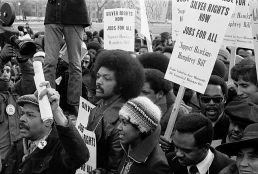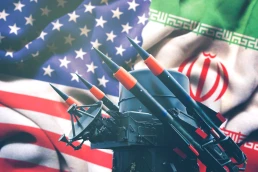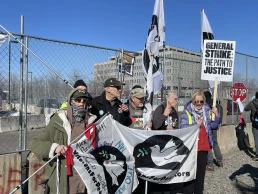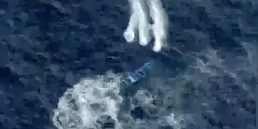“If I were asked what regrets I have today, they would have to do with doing a job I was asked to do that I knew was wrong for the country, and I did it to the best of my ability. The water was carried on by people who acted like that.”
We spend the hour with Pentagon Papers whistleblower Daniel Ellsberg, who recently announced that he has been diagnosed with inoperable pancreatic cancer with only months left to live. Ellsberg, who turned 92 on April 7, may be the world’s most famous whistleblower. In 1971, The New York Times began publishing excerpts of the Pentagon Papers — 7,000 pages of top-secret documents outlining the secret history of the Vietnam War. The Times exposé was based on documents secretly photocopied by Ellsberg and Anthony Russo while they worked as Pentagon consultants at the RAND Corporation. The leak ultimately helped to take down President Nixon, turn public sentiment against the War in Vietnam and lead to a major victory for press freedom. The Nixon administration went to extraordinary lengths to silence and punish Ellsberg, including breaking into his psychiatrist’s office. But the government’s misconduct led to charges against him and Russo being dismissed. Over the past five decades, Ellsberg has remained a leading critic of U.S. militarism and U.S. nuclear weapons policy, as well as a prominent advocate for other whistleblowers. “Why in the world are we in this position, time after time, of fighting against the self-determination or the nationalism of other countries, and taking on those murderous tasks as opposed to dealing with problems at home?” says Ellsberg in an in-depth interview with Democracy Now!
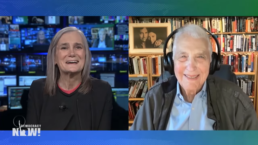
AMY GOODMAN: This is Democracy Now!, democracynow.org, The War and Peace Report. I’m Amy Goodman.
Today we spend the hour with Pentagon Papers whistleblower Daniel Ellsberg. He recently announced he’s been diagnosed with inoperable pancreatic cancer. In a letter to friends, Dan Ellsberg wrote, quote, “I feel lucky and grateful that I’ve had a wonderful life far beyond the proverbial three-score years and ten. I feel the very same way about having a few months more to enjoy life with my wife and family, and in which to continue to pursue the urgent goal of working with others to avert nuclear war in Ukraine or Taiwan (or anywhere else),” unquote.
Dan Ellsberg turned 92 on April 7th. He may be the world’s most famous whistleblower. In 1971, The New York Times began publishing excerpts of the Pentagon Papers — 7,000 pages of top-secret documents outlining the secret history of the Vietnam War. The Times exposé was based on documents secretly photocopied by Dan Ellsberg and Anthony Russo while they worked as Pentagon consultants at the RAND Corporation.
Ellsberg had been inspired to leak the documents by antiwar protesters. In fact, shortly before the Times first reported on the Pentagon Papers, Dan Ellsberg took part in an antiwar protest in Washington, D.C., 52 years ago today, on May Day 1971, as part of an affinity group with Noam Chomsky and Howard Zinn.
The Pentagon Papers leak would end up helping take down President Nixon, help end the War in Vietnam and lead to a major victory for press freedom. The Nixon administration would go on to take extraordinary measures to silence and punish Ellsberg, including breaking into his psychiatrist’s office. But the government’s misconduct led to charges against him being dismissed.
Over the past 50 years, Daniel Ellsberg has remained a leading critic of U.S. militarism and U.S. nuclear weapons policy, as well as a prominent advocate for other whistleblowers.
I spoke to him Thursday from his home in Berkeley, California.
AMY GOODMAN: Dan, it’s wonderful to have you with us. I’m so appreciative that you’re letting us into your home to have this conversation today.
DANIEL ELLSBERG: Well, it’s so good for me to be back here, Amy. There is literally no one in American media, American life, that I more appreciate having the chance to talk about the state of the world with. And I love having me back on.
AMY GOODMAN: Well, I thank you so much for taking this time. And I wanted to start off with this letter that you sent to friends about learning in February that you had inoperable pancreatic cancer. Can you talk about this? Can you talk about how you’re feeling?
DANIEL ELLSBERG: There’s an expression that goes way back to Marcus Aurelius, in fact, that you should live each day as though it were your last day on life — on Earth. That’s pretty hard to do. You’d spend the day canceling appointments, not making any others. But spending this month as though it were my last month on Earth is very realistic for me, and it works very well for me. I can recommend it to others.
AMY GOODMAN: So, talk about what you’ve been doing since you’ve gotten this diagnosis, and also your decision not to have chemotherapy.
DANIEL ELLSBERG: Well, sometime you’d go by exploring possible unusual forms of chemotherapy, immunotherapy and others, if I were a candidate for them. And a sort of a month went by there by well — very well-intended people who were encouraging me to seek a way out here, but those didn’t seem to apply, after all. And I just have to accept what most people with pancreatic cancer have to, that there is no promising way out.
I did choose to use these days in a way of saying what I think is important to the world, and my last chance to do it may be my last chance on this call, on this program — and maybe not — and to be with my family and friends. I’ve seen all my grandchildren now and my children, and spend a lot of time saying goodbye and getting in touch with their problems and being a family person, which is not my forte, actually. I love my family, but I’ve spent a lot of time being obsessed in other things over the years, and I regret that. But I have spent wonderful time.
Just yesterday was my wife’s birthday. And we recall that it was on April 17th, 1965 — not everyone can remember their first date like that, but that was the first SDS march against the war. And I was working in the Pentagon on the war, pursuing the war. She was going to interview people in a nationwide interview program she had, and she induced me to carry her Uher heavy phonograph around with her — tape recorder, to interview people. And I marched up to the White House hoping — carrying that recorder and hoping that I would not be in any picture of The Washington Post, where my colleagues at the Pentagon would say, “What? He’s protesting the war?” on my one day off from the war during this. But the next day, I induced her to go to the cherry blossoms, and that was our first date. And we’ve been together ever since. So that was 57 years ago.
AMY GOODMAN: She really was the one who exposed you — is this right? — to the antiwar movement by forcing you to carry her tape recorder. I mean, you were protesting right outside where you worked. You had gone from RAND Corporation to the Pentagon.
DANIEL ELLSBERG: Actually, it was outside the Lincoln Memorial where we heard the speeches, and then we marched toward the White House and around the White House. I went back that evening to the Pentagon, where I was working, having gotten her to promise to meet me the next day to go see the cherry blossoms.
But I was very much in sympathy with what I was hearing on that stadium from I.F. Stone and others about the war. I felt at that time, as a cold warrior, that we were picking the wrong place to plant the flag on this one. This was a loser. And I was not enthusiastic about our getting involved in it. But that was my job, and I did it all too well. If I were asked what regrets I have today, they would have to do with doing a job I was asked to do that I knew was wrong for the country, and I did it to the best of my ability. The water was carried on by people who acted like that.
AMY GOODMAN: So, I want to talk about what you decided to do and how seminal, how key, the antiwar movement was to your thinking, not only meeting Patricia, but also seeing those war resisters, what were called draft dodgers, the draft resisters, who said they’d rather be in prison than on the frontlines in the War in Vietnam.
DANIEL ELLSBERG: Well, many, many people — when the Pentagon Papers came out, a lot of people in the antiwar movement said, “What’s new about this? This what we’ve been saying all along,” which was true, which was we had taken up a French neocolonial role, an imperial role, essentially, against the self-government of Vietnam and sovereignty of Vietnam, and were doomed to suffer the same fate as the French, essentially, to keep killing people and losing people until we finally decided to go home and leave them ruling their own home. Well, that was known inside. The insiders who were pursuing the war and dropping the bombs, millions of tons of bombs — it came to me even later than this — knew the same thing and were doing it likewise. The question was what to do about it.
All the people I was working with in the government by that time felt — everyone I could think of felt the war was hopeless, essentially. It was hopelessly stalemated, and there was no coming out. The word “hope” — “stalemate” was taboo on the year I came back from Vietnam with hepatitis, in 1967, after two years there. Lyndon Johnson had said, “No official is to use the word or hint at the word ‘stalemate.’” And yet, that’s where it was. So, the war continued. People did their jobs. And it went on as though that judgment had not been made.
And eventually, what I really noticed was that there were people who felt much as I did, and who were doing an awful lot more about it than I was doing. Namely, these were young people who — you didn’t have to be an expert. You didn’t have to have a Ph.D. in international relations as somebody to see the truth about the War in Vietnam. As somebody said, you don’t have to be an ichthyologist to know when a fish stinks. And these young people refused to go to be drafted to — when they could have gone to Canada or Sweden or gotten a deferment or joined the Air Force National Guard, like George W. Bush, somehow gotten out of the fighting. But, no, they chose to give it as strong a resistance as they could, nonviolently, in the footsteps of Rosa Parks in the South and Martin Luther King and others, and to say, “No, this is wrong. You have to do this over our bodies. We will not participate in this, because it’s wrong.” And I realized, when I met young men like this, like Bob Eaton and Randy Kehler, who were on their way to prison, simply to make the strongest message they could, which I believed, as well, that the war was wrong. I realized I could think of doing what they did, too, instead of just talking to insiders, who felt as I did but agreed there was just nothing you could do about it, as long as the president wanted to carry on the war and his subordinates wanted to keep their jobs under the president, that they could, in fact, dissociate themselves from it and denounce the war openly.
Very recently, we’ve seen very many comments that what the Pentagon Papers showed was that the war was not winnable. Actually, that had — and that’s why I gave the Pentagon Papers, and that was the effect of them. Actually, none of the people who went to prison to protest the war did so because they thought the war was not winnable. They did it because they thought the war was wrong. And that’s something, I think, that people have not succeeded — have not been willing to recognize all these years, not just that the war — not just that the U.S. had taken on some noble measure that it wasn’t quite energetic enough to pursue or had other — or was easily distracted from, or something like that, but that our country was, like so many other countries, capable of doing wrong and killing people without good reason, and, in effect, an imperial kind of operation like that of the Japanese, or the French after the Japanese, or the Chinese before either of them. And those are the footsteps we were walking in.
Well, I think, to this day, the very idea that the U.S. is in some ways comparable to those empires, that it is an empire, is a taboo, and a very unfortunate one, because it makes it impossible to understand what’s going on. Why are we doing this? What’s happening? Why in the world are we in this position, time after time, of fighting against the self-determination or the nationalism of other countries, and taking on those murderous tasks as opposed to dealing with problems at home?
I think of our country as a covert empire, where “covert” is a term of art in the Pentagon and the CIA, in particular. And I worked with CIA people in Vietnam. My immediate boss there was a retired CIA general, General Edward Lansdale. And the word “covert” means plausibly deniable. It means not just secret, I’m doing something that I don’t tell you about, but that I plant evidence to suggest that I’m doing something different, and I’m not doing it, somebody else is doing it, and the person above me is somebody else — layer after layer to prevent the president from holding any accountability for what’s happening. I think we not only feel we need and do be able to plausibly deny that we are an empire, that we run other people’s governments, other people’s police forces, that we decide who goes to jail and who gets shot in that country. And second, we deny the means we do to keep it a covert empire — assassinations, paramilitary, military buildups, and even overt wars, in some cases, as in Vietnam or Iraq.
AMY GOODMAN: Dan, I wanted to go to that decision you made after giving your 13-year-old son Robert a copy of Thoreau’s essay on Civil Disobedience, the civil disobedience you engaged in. This is a clip from that 2009 documentary, The Most Dangerous Man in America: Daniel Ellsberg and the Pentagon Papers.
DANIEL ELLSBERG: It was the evening of October 1st, 1969, when I first smuggled several hundred pages of top-secret documents out of my safe at the RAND Corporation. The study contained 47 volumes, 7,000 pages. My plan was to xerox the study and reveal the secret history of the Vietnam War to the American people.
NEWSCASTER: The FBI was trying to find out who gave The New York Times a copy of the Pentagon’s secret study.
MIKE GRAVEL: Pow!, like a thunderclap, you get The New York Times publishing the Pentagon Papers, and the country is panicking.
HENRY KISSINGER: This is an attack on the whole integrity of government. If whole file cabinets can be stolen and then made available to the press, you can’t have orderly government anymore.
WALTER CRONKITE: A name has now come out as the possible source of the Times Pentagon documents. It is that of Daniel Ellsberg, a top policy analyst for the Defense and State Department.
PRESIDENT RICHARD NIXON: I think it is time in this country to quit making national heroes out of those who steal secrets and publish them in the newspaper.
PATRICIA ELLSBERG: In the first year of marriage, we’re talking about him going to prison for the rest of his life.
REPORTER: Dr. Ellsberg, do you have any concern about the possibility of going to prison for this?
DANIEL ELLSBERG: Wouldn’t you go to prison to help end this war?
EGIL ”BUD” KROGH JR.: We felt so strongly that we were dealing with a national security crisis. Henry Kissinger said that Dr. Daniel Ellsberg was “the most dangerous man in America” and he had to be stopped.
AMY GOODMAN: So, that, a clip from The Most Dangerous Man in America by Judith Ehrlich and Rick Goldsmith. I remember when we had you on, Dan, so many different times, beginning 27 years ago. You were one of our first guests on Democracy Now! But when this documentary came out, you and Patricia, your wife, came on the show with the directors. This goes to that point where you understood the stakes of what you were going to do. You brought your two little kids, 13-year-old Robert, 10-year-old Mary, to help you — not that they completely understood what you were doing — xerox the 7,000 pages of the secret history of Vietnam, U.S. involvement in Vietnam?
DANIEL ELLSBERG: That’s right. I hadn’t really meant to bring my daughter, but on the second occasion — at all. She was only 10. But she had complained about being left in the car when I went up to do some last-minute xeroxing with Robert. And once she was up there, she complained about being given nothing to do. So we gave her scissors. And when, by mistake, the police came to the door for the second time during this project, because the owner of the shop had not turned the key correctly and had set off an alarm in the police station — so, when the police arrived at the door, they found my son, who was 13 at that time. My Robert was running the Xerox machine, and I was collating on the floor various copies we were making. And Mary, who was 10, was cutting “top secret” off the tops and bottoms of the pages with the scissors — kind of a family project. So they saw how innocent it was, and they left.
But my objective with my son, in particular, was to let him see that there were times when the best thing you could do, you really needed to say no to a government policy, even at the risk of prison. And I wanted him to see that I had not gone off my nut, as I would be described shortly, I was sure, that I was not acting as a traitor or fanatically or hysterically. I was just doing something in a businesslike way that I felt had to be done, even though it had a risk. I wanted to plant that idea in his life. And it took hold, as it did with my daughter. My son is the editor-in-chief of Orbis Books, the Catholic seminary of liberation theology publishing house, and my daughter is head of a Violence Against Women project, a worldwide project at American University, both of them having been arrested at various times. It’s a family that —
AMY GOODMAN: And you wanted them to know this because you recognized that this could be among the last time you were spending with them.
DANIEL ELLSBERG: I would see them. Yes, I thought they’d otherwise just see me through heavy glass in a prison and would have — the way that Julian Assange has had to grow up with his young sons in his total-security prison in Belmarsh for having facilitated truth-taking of the same kind that I’ve done. As a matter of fact, his is the first prosecution of a journalist for putting information out. And it will not be the last, if he’s successfully extradited over here. So, he has a couple of children who’ve seen him, literally, only in prison — and better than not seeing him at all. That’s certainly the case.
But what he — I revealed this year that I had the information from Julian Assange, essentially, that Chelsea Manning had given Assange and which was later put out in the papers. I had that before the papers, before the newspapers had them, meaning that I was as indictable right now, as I’m talking to you, as any of the people who have been indicted by this Justice Department, because they’re working with a law whose plain language is, on the one hand, unconstitutional, from the point of view of the First Amendment, but, read properly, just says that anyone who reads or handles or stores a piece of paper that has been marked to be protected, marked classified by the government, is subject to imprisonment. That implies even to readers of The New York Times and, very definitely, to journalists, like Charlie Savage, or the publishers or Julian himself. In other words, in that respect, we’ve gone backwards since that day. That was — after all, mine was the first prosecution of anyone for telling the truth to the American people. And there have been several dozen since. And the first one of a journalist, actually, is, I think, just preceding the first one of a reader, before we get there. So, this law, the Espionage Act, very much needs to be repealed or rescinded in such a way that it does not serve like a British Official Secrets Act, which was a perfect law for an empire.
AMY GOODMAN: Dan, even before the Pentagon Papers were published in the Times, but after you had given the secret — the top-secret report to the Times, you were trying to end this war any which way. We’re broadcasting this show on May Day, on May 1st. And it was May 1st, 1971, that you led a small affinity group that included, what, Howard Zinn, the late great historian, and Noam Chomsky, to Washington to protest the war. I think Howard would get arrested later that day. But can you talk about that moment, that protest with Howard, Noam and others?
DANIEL ELLSBERG: Well, the idea was that if they won’t stop — it was Rennie Davis’s idea — that if they won’t stop the war, we’ll stop the government. And so, they had — they had about 25,000 people, which was not enough, actually, to do it. But we were in affinity groups. And as you say, I was in a very privileged one, privileged for me, with Howard Zinn and Noam Chomsky and Marilyn Young and Fred — a number of others, Mitch Goodman, Mark Ptashne. And we did, in fact, get beaten over the head on the streets on several times and got the advantage of testing, field testing, their pepper sprays directly into the face, which is very effective, if I can — I’ll give a little blurb for it here. It is very disorienting indeed.
And then, again, we thought it was pretty much over when they began just clearing the streets of Georgetown by arresting everybody there, including, to their fault, a number of congressman’s children who were shopping in Georgetown. Thirteen thousand people were arrested and put in RFK Stadium, without any warrants, without any paperwork as to why they’d been arrested, why they were there. So, in the end, they were paid a small indemnity for having done that.
AMY GOODMAN: We’ll continue our conversation with Pentagon Papers whistleblower Dan Ellsberg in 20 seconds.
[break]
AMY GOODMAN: Willie Nelson, singing “A Peaceful Solution” in our old studios at the firehouse in 2008. He turned 90 on Saturday.
Recent Posts
The Left Owes a Lot to Jesse Jackson
February 19, 2026
Take Action Now As a movement builder, spokesperson, and candidate for the presidency, Jesse Jackson’s accomplishments were massive. He was one of…
Trita Parsi Warns U.S. & Iran Have Incentives to Escalate Conflict
February 19, 2026
Take Action Now “We have a very dangerous situation, because both sides actually believe that a short, intense war may improve their…
Minneapolis: Organizing for the Protection of the Community
February 18, 2026
Take Action Now In speaking with residents in several parts of Minneapolis, beautiful stories of organizing on a block-by-block level emergedBy…
U.S. Sent a Rescue Plane For Boat Strike Survivors. It Took 45 Hours To Arrive.
February 17, 2026
Take Action Now In seas that could kill a person within an hour, it took nearly two days for a rescue plane to arrive.By Tomi McCluskey and Nick…

